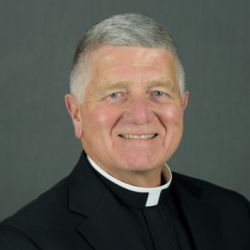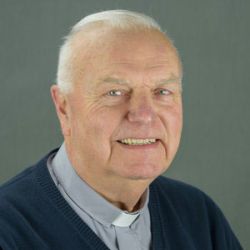-
Our Parish
Our Clergy

Fr Robert Kirk
Pastor

Fr Edward Meeks
Pastor Emeritus

Dcn Bud Reick
Retired Deacon

Bishop Steven J. Lopes
About Our Parish
Christ the King Church is a community of faithful Christian believers of all ages in the Greater Baltimore area. Founded in April 1996 as a parish of the Charismatic Episcopal Church, and later in the Anglican Church in America, Christ the King became a Roman Catholic parish in The Personal Ordinariate of the Chair of St. Peter, under the provisions of Pope Benedict XVI’s Apostolic Constitution Anglicanorum Coetibus.
On June 24th, 2012, Christ the King, together with its clergy and congregation, was received into the Ordinariate by the Rev. Msgr. Jeffrey N. Steenson, Ordinary.
As a former Anglican parish with Charismatic roots, our Sunday Mass features both traditional hymnody and contemporary praise songs, coupled with the forthright preaching of the Word of God, all centered on the celebration and reception of the Holy Eucharist
About the Ordinariate
Anglicanorum coetibus (Groups of Anglicans, Nov. 4, 2009) is the Apostolic Constitution of Pope Benedict XVI that establishes “Personal Ordinariates” for those of the Anglican heritage entering full communion with the Catholic Church while maintaining distinctive elements of their theological, spiritual, and liturgical patrimony.
On January 1, 2012, the Solemnity of Mary, the Mother of God, the Personal Ordinariate of the Chair of St. Peter was established. Equivalent to a diocese, the Ordinariate is composed of parishes, groups, religious communities, and individuals of the Anglican heritage gathered around the Ordinary. He serves under the direct authority of the Pope, in partnership with the bishops of the United States Conference of Catholic Bishops, to build up the Church through mutual mission and ministry while retaining elements of the Anglican patrimony.
The members of the Ordinariate include “those faithful, of every category or state of life, who, originally having belonged to the Anglican Communion, are now in full communion with the Catholic Church, or who have received the sacraments of initiation within the jurisdiction of the Ordinariate itself, or who are received into it because they are part of a family belonging to the Ordinariate” (Decree of Establishment, 1). Joining the new pilgrims may also be the clergy and people of the Anglican Use parishes, who have been the pioneers in the noble work of living out the Anglican patrimony within the Catholic Church.
The key to understanding the essential purpose of the Ordinariate is to be found in the preface to Anglicanorum coetibus. In those opening paragraphs, there are no fewer than nine references to the Vatican II document Lumen Gentium, the Dogmatic Constitution on the Church. Here the one Church of Jesus Christ is said to subsist in the Catholic Church: although many elements of sanctification and of truth are found outside of its visible structure, these elements, as gifts belonging to the Church of Christ, are forces impelling toward catholic unity. There is an inner dynamic in the life and teaching of Anglicanism which continues to draw Anglicans to its source. The Personal Ordinariate is Pope Benedict XVI’s response to “this holy desire.”
These early days in the life of the Ordinariate will be full of exciting challenges. The lay faithful will be engaged in a process of catechetical formation, following the Catechism of the Catholic Church, to prepare them for reception and full communion. The clergy will be enrolled in an intensive program of priestly formation, based at St. Mary’s Seminary in Houston, that will run concurrent with the spring academic semester. The Ordinariate will need a set of norms to govern its life, and the assistance of the Canon Law Society of America is proving invaluable. Financial resources must be secured, but the prayers, encouragement, and support of so many in the Catholic Church have already been a tremendous blessing.
